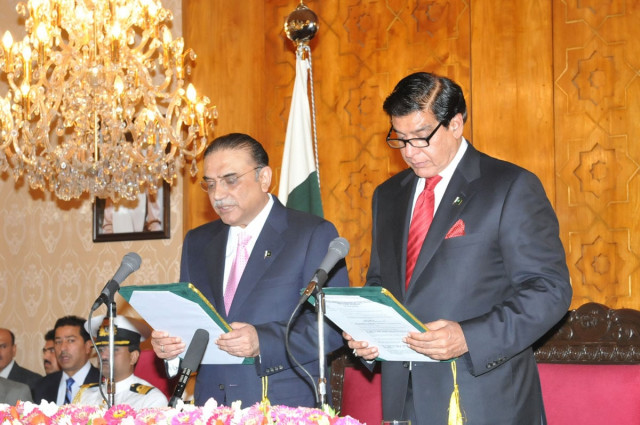New PM strikes a conciliatory note
Seeks opposition’s help to tackle a myriad of problems; Zardari heaps praise on Gilani.

In his first speech to Parliament shortly after his election as the country’s prime minister, Raja Pervaiz Ashraf struck a conciliatory note – inviting opposition parties to help his government steer the country out of a myriad of problems.
Ashraf’s election signals that the ruling Pakistan Peoples Party is in no mood of bowing out and instead it’s determined to see its five-year constitutional tenure out – for the first time in the parliamentary history of Pakistan.
“It is time to write a new history – a history which will manifest the aspirations of (Pakistani) people and this should be our destination,” Ashraf told lawmakers on Friday.
In a veiled reference to the ongoing executive-judiciary row, he reiterated the need for harmony among state institutions. “We do not desire politics of confrontation. Our country cannot afford it. We invite the opposition for dialogue to resolve the problems,” he added.
The premier heaped praise on the PPP-led coalition for its ‘achievements’, but admitted that the country still faced an array of challenges, including rampant poverty and unemployment, a grueling energy crisis and an economy caught up in a time warp.
“We can only tackle these challenges with the cooperation of parliament and collective wisdom,” he added.
Ashraf started his speech by praising both his predecessor Yousaf Raza Gilani and President Asif Ali Zardari. “I stand by Gilani who strengthened the democratic institutions,” he said. “The office I have been elected to is sacred and respectable for me and I will endeavour to come up to the expectations of my people, my party and the house.”
Ashraf had faced criticism for an earlier pledge as minister for water and power in Gilani’s cabinet that “load shedding will end in 2009”. On Friday, however, he cautiously chose his words while pledging his resolve to end the ongoing energy crisis. “Efforts will be made to reduce the crisis,” he said.
He also assured parliamentarians of free, fair and transparent elections.
Balochistan issue
Touching on the festering issue of Balochistan, Ashraf said a solution to the province’s problems would be his government’s first priority. “My party wants to kick off talks with the Baloch leadership to bring prosperity and development in the province.”
He pledged to create employment opportunities for the youth in Balochistan, as well as other provinces.
Ashraf also called on Taliban militants to surrender their arms and renounce militancy. “The irresponsible behaviour of religious extremists has ruined Islam and Pakistan. I, as the prime minister of Pakistan, appeal them to lay down arms and join the mainstream of life,” he said.
International relations
On the international front, the new premier said his government would continue dialogue for peace with India and all other neighbouring countries, including Iran and Afghanistan.
He also promised to develop ‘cordial relations’ with the US, which have come under severe strain over the past year following a US raid that killed al Qaeda leader Osama bin Laden and a Nato air strike in Salala that left 24 Pakistani soldiers dead.
“We will develop cordial relations with the US and international community on the basis of equal rights and dignity,” he said.
President Zardari praises Gilani
At the oath-taking ceremony, President Zardari heaped praise on Yousaf Raza Gilani for all that he did for the people ‘despite so many difficulties and challenges’.
“In doing so he paid a very high personal price. But he stood firmly to protect the democratic principles, the supremacy of parliament and of the Constitution,” Zardari said.
“Yousaf Raza Gillani has held high the torch lit by our leaders Shaheed Zulfikar Ali Bhutto and Shaheed Mohtarma Benazir Bhutto. I wish to compliment him.”
Gilani was disqualified by the apex court over contempt charges for his refusal to write a letter to the Swiss authorities seeking reopening of a dormant graft case against President Zardari.
But the president said, “The ultimate court is the court of the people. The ultimate verdict is pronounced by history. The people and history will give their verdict sooner than later.”
Without naming anyone, the president said the detractors of democracy have long been hounding Gilani.
“They thought that the coalition will not be able to agree on a new leader of the house. They hoped that it will give them a chance to send the house packing and create political uncertainty,” he added. “They have been proved wrong.”
WITH ADDITIONAL INPUT FROM AGENCIES
Published In The Express Tribune, June 23rd, 2012.



















COMMENTS
Comments are moderated and generally will be posted if they are on-topic and not abusive.
For more information, please see our Comments FAQ